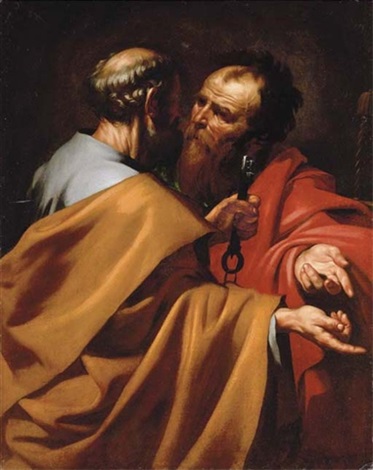The Sligo Presbyterian Church Thursday Evening Study is studying Paul’s letter to the Galatians. Over five weeks we’ll consider the following topics:
- May 30 – Paul Sends a Letter (Galatians 1:1-12)
- June 6 – Grace (Galatians 1:13 - 2:21)
- June 13 – Examples One through Three (Galatians 3:1-29)
- June 20 – Examples Four through Six (Galatians 4:1 – 5:12)
- June 27 – So What (Galatians 5:7 – 6:18)
During our second session, we looked at Galatians 1:13 - 2:21. Below is a recording of our discussion and the passage.
Galatians 1:13 - 2:21 [New Revised Standard Version]
You have heard, no doubt, of my earlier life in Judaism. I was violently persecuting the church of God and was trying to destroy it. I advanced in Judaism beyond many among my people of the same age, for I was far more zealous for the traditions of my ancestors. But when God, who had set me apart before I was born and called me through his grace, was pleased to reveal his Son to me, so that I might proclaim him among the Gentiles, I did not confer with any human being, nor did I go up to Jerusalem to those who were already apostles before me, but I went away at once into Arabia, and afterwards I returned to Damascus. Then after three years I did go up to Jerusalem to visit Cephas and stayed with him fifteen days; but I did not see any other apostle except James the Lord’s brother. In what I am writing to you, before God, I do not lie! Then I went into the regions of Syria and Cilicia, and I was still unknown by sight to the churches of Judea that are in Christ; they only heard it said, “The one who formerly was persecuting us is now proclaiming the faith he once tried to destroy.” And they glorified God because of me.
Then after fourteen years I went up again to Jerusalem with Barnabas, taking Titus along with me. I went up in response to a revelation. Then I laid before them (though only in a private meeting with the acknowledged leaders) the gospel that I proclaim among the Gentiles, in order to make sure that I was not running, or had not run, in vain. But even Titus, who was with me, was not compelled to be circumcised, though he was a Greek. But because of false believers secretly brought in, who slipped in to spy on the freedom we have in Christ Jesus, so that they might enslave us— we did not submit to them even for a moment, so that the truth of the gospel might always remain with you. And from those who were supposed to be acknowledged leaders (what they actually were makes no difference to me; God shows no partiality) —those leaders contributed nothing to me. On the contrary, when they saw that I had been entrusted with the gospel for the uncircumcised, just as Peter had been entrusted with the gospel for the circumcised (for he who worked through Peter making him an apostle to the circumcised also worked through me in sending me to the Gentiles), and when James and Cephas and John, who were acknowledged pillars, recognized the grace that had been given to me, they gave to Barnabas and me the right hand of fellowship, agreeing that we should go to the Gentiles and they to the circumcised. They asked only one thing, that we remember the poor, which was actually what I was eager to do.
But when Cephas came to Antioch, I opposed him to his face, because he stood self-condemned; for until certain people came from James, he used to eat with the Gentiles. But after they came, he drew back and kept himself separate for fear of the circumcision faction. And the other Jews joined him in this hypocrisy, so that even Barnabas was led astray by their hypocrisy. But when I saw that they were not acting consistently with the truth of the gospel, I said to Cephas before them all, “If you, though a Jew, live like a Gentile and not like a Jew, how can you compel the Gentiles to live like Jews?” We ourselves are Jews by birth and not Gentile sinners; yet we know that a person is justified not by the works of the law but through faith in Jesus Christ. And we have come to believe in Christ Jesus, so that we might be justified by faith in Christ, and not by doing the works of the law, because no one will be justified by the works of the law. But if, in our effort to be justified in Christ, we ourselves have been found to be sinners, is Christ then a servant of sin? Certainly not! But if I build up again the very things that I once tore down, then I demonstrate that I am a transgressor. For through the law I died to the law, so that I might live to God. I have been crucified with Christ; and it is no longer I who live, but it is Christ who lives in me. And the life I now live in the flesh I live by faith in the Son of God, who loved me and gave himself for me. I do not nullify the grace of God; for if justification comes through the law, then Christ died for nothing.




No comments:
Post a Comment